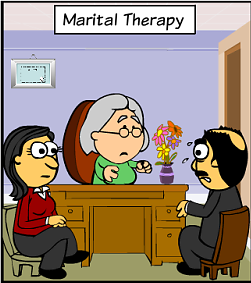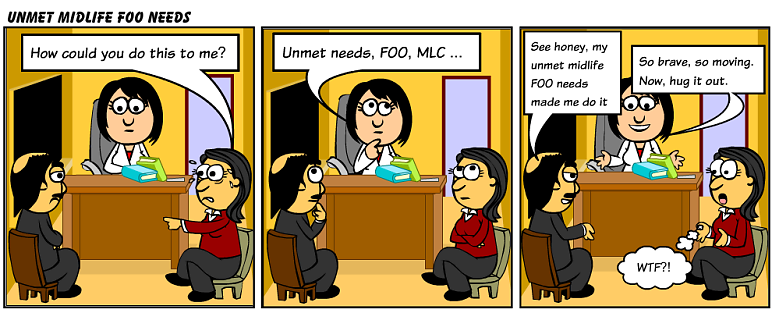Rushing Off to Therapy
 When you’re flailing around like a dying fish in the face of your spouse’s infidelity, you will probably hear a chorus of advice sending you off to a marriage counselor or couple’s therapist. On the surface, it makes a lot of sense, right?
When you’re flailing around like a dying fish in the face of your spouse’s infidelity, you will probably hear a chorus of advice sending you off to a marriage counselor or couple’s therapist. On the surface, it makes a lot of sense, right?
In our view and experience, marital counseling in the immediate aftermath of an affair is a Really Bad Idea.
Before you reach for your smelling salts or roll your eyes at how mistaken I am, or how I must be anti-therapy, consider how a cheater actually manages to have an affair: They gaslight, they control the flow of salient and honest information, and they lie. In short, they manipulate. They feel entitled to manipulate you in order to engineer an outcome that they desire: You, firmly in place where they want you, so they benefit from you and their affair.
The inherent manipulative inclinations of a cheater isn’t the only issue in the Why Marital Therapy Is A Really Bad Idea bag, so let’s look at those before we circle back to the cheater.
Therapists
Therapists generally have pro-marriage attitudes. Let’s be honest - they’re in business. It’s financially beneficial to them to have you stay together, to ‘work on your marriage’, and for them to institute a long-term ‘treatment program’ for any resultant dysfunction and conflict. Your mess is their pay check.
Sound cynical? Ask your therapist what they see as their best outcome for you. Ask what their ‘saved marriage’ statistics are and what their client retention rate is. Grill them about their view on divorce rates, marriage and religion. It’s not common to find one who will champion personal goals even if they take you away from the marriage. They have their own agenda - you should at least understand it.
“The people who would like to manipulate and use you won’t tell you your blind spots. They may plan to continue using them to their advantage.”
~ Assegid Habtewold
Gonna Find Out Who’s Naughty or Nice
(Hey, it was seasonal! 😉 )
It’s worth noting too that most therapists aren’t trained in how to deal with infidelity, so will often talk about ‘unmet needs‘, collaborative communication skills v2.0, and creating a ‘safe environment’ to allow the cheater to properly express their angst arising from their family of origin issues.
When you arrive at the therapist’s office, you would be kindly and sagely advised to create an environment that enables your cheater to safely express how you failed to meet their needs. You would be expertly guided through identifying the vulnerabilities in your relationship, in order to immunize it against another affair.
Both the cheater and the spouse want the therapist to to lend ‘professional’ weight to their own viewpoint. The faithful spouse wants the therapist to bludgeon the cheater over the head with how wrong they were, the hurt they caused, and how they must make amends. The cheater wants the therapist to hammer home how their affair was a symptom of a crappy upbringing and dissatisfaction in the marriage, how they felt unloved and unappreciated, and for the faithful spouse to understand how they drove the cheater to it.
Why Are YOU in Therapy?
Their affair was not your fault. You didn’t cause it or drive them to it. You aren’t crazy for suspecting them, it is normal to react with fury and devastation in equal measure, and you can’t just get over it already.
‘The marriage’ was not the cause of the affair. You were not the cause of the affair. So by what incredible feat of magic will ‘working on the marriage’ or yourself resolve a cheater’s personal entitlement to screwing around?
Attendance to couple’s counseling telegraphs that you too believe that you were partially responsible for the cheater’s affair. By your willingness to be there, talking about ‘yourself’ or ‘the marriage’ in terms of their affair, you’re giving the cheater the thumbs up to offload to you some degree of accountability for their choices. It’s signaling, “Yes, their affair was wrong but my failings are the originating and therefore causative wrong. I am partially -or perhaps more- to blame for their affair“.
You are not at fault, so why are you there behaving as if you were somehow complicit? You do not need help, guidance, or correction because someone chose to cheat on you.
Therapist-Assisted Manipulation
 Now, bear in mind that keeping you in the marriage is a business opportunity for the therapist and then wheel back around to how a cheater manages an affair. It’s worth repeating:
Now, bear in mind that keeping you in the marriage is a business opportunity for the therapist and then wheel back around to how a cheater manages an affair. It’s worth repeating:
They gaslight, they control the flow of salient and honest information, and they lie. In short, they manipulate.
So, how does you attending marital therapy become a manipulation tool for the cheater? Well, this is some of what therapy teaches cheaters:
- How to further manipulate you into seeing your own ‘part’ in their dissatisfaction.
- How to manipulate you into feeling sorry for them and feeling obliged as their spouse to help fix their brokenness (for better or worse, right?).
- How to identify therapist sanctioned ‘needs’ that they were seeking to fulfill.
- What YOUR soft spots are and how you ‘need’ the cheater to behave for the marriage to ‘work.’
So, to translate that:
- A cheater in the immediate aftermath of their affair has not undergone ANY changed thinking.
- The entitled, manipulative thinking that was in place during the affair is STILL IN EFFECT.
- The cheater already has a clearly identified goal: KEEP YOU IN PLACE
- Therapy teaches them how to say the right things, make the right moves, press your buttons, and how to mask their underlying thinking.
Frankly, marital therapy with a cheater in full-on cheater mode is akin to handing them the keys to the kingdom. It gives them further power and tools to engineer their desired outcome, preserving their lifestyle and keeping you engaged and believing that they’ve changed, without changing a single mote of the thinking that led them to cheat to begin with.
“Presenting a humble façade gains trust; flattery appeals to ego; combine the two to gain an ego-based trust within someone, and you will find in your hands a judgement-clouding tool second only to love.”
~ A. J. Darkholme
Individual Therapy
Leave the couple’s therapy until you’ve both had some time to work through the personal implications of the affair. Give yourselves time to really understand if reconciliation is truly right for both of you.
Individual therapy might be a reasonable stop gap if you are struggling to cope with the effects of the cheater’s affair, or if the cheater genuinely wants some qualified help in trying to address the real cause of their affair.
Either way, be watchful for therapy-speak without any inherently changed thinking.
“When you know what a man wants you know who he is, and how to move him.”
~ George R. R. Martin














